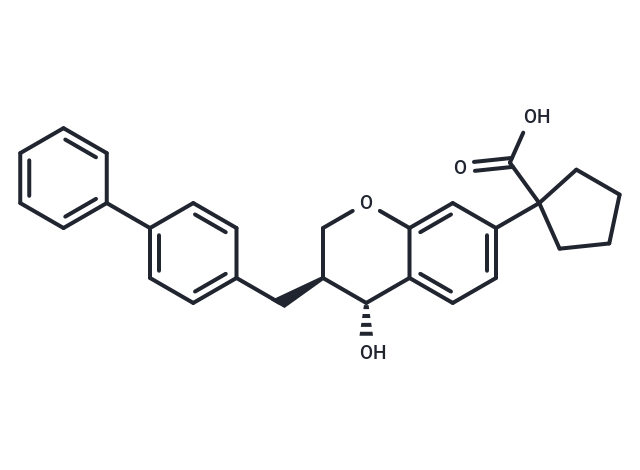Shopping Cart
- Remove All
 Your shopping cart is currently empty
Your shopping cart is currently empty

CP-105696 is a potent and selective leukotriene B4 (LTB4) receptor antagonist used to study allograft rejection.

| Pack Size | Price | Availability | Quantity |
|---|---|---|---|
| 1 mg | $56 | In Stock | |
| 5 mg | $128 | In Stock | |
| 10 mg | $215 | In Stock | |
| 25 mg | $358 | In Stock | |
| 50 mg | $536 | In Stock | |
| 1 mL x 10 mM (in DMSO) | $146 | In Stock |
| Description | CP-105696 is a potent and selective leukotriene B4 (LTB4) receptor antagonist used to study allograft rejection. |
| Targets&IC50 | LTB4:8.42±0.26 nM |
| In vitro | CP-105696 is a structurally novel, selective, and potent LTB4 receptor antagonist. In vitro, it inhibits [3H]LTB4 (0.3 nM) binding to high-affinity LTB4 receptors on human neutrophils with an IC50 of 8.42±0.26 nM and acts as a noncompetitive antagonist. It noncompetitively inhibits LTB4 (5 nM)-mediated human neutrophil chemotaxis with an IC50 of 5.0±2.0 nM. For low-affinity receptors on neutrophils, CP-105696 acts as a competitive antagonist according to Scatchard analyses. Additionally, it competitively inhibits LTB4-mediated CD11b upregulation on human neutrophils (pA2=8.03±0.19). At 10 μM, CP-105696 does not inhibit human neutrophil chemotaxis or CD11b upregulation mediated by other G-protein coupled receptors (e.g., C5a, IL-8, PAF). In isolated human monocytes, it inhibits LTB4 (5 nM)-mediated Ca2+ mobilization with an IC50 of 940±70 nM[2]. |
| In vivo | At a dose of 50 mg/kg/day for 28 days, B10.BR (H2k) allografts transplanted into C57Bl/6 (H2b) recipients show significant protection, with mean survival time of 27±20 days (n=10) compared to control grafts' 12±6 days (n=14); P=0.0146. Using an induction protocol (day -1 to day 3), CP-105696 at 100 mg/kg/day significantly prolongs allograft survival to 33±23 days (n=9; P=0.0026), whereas at 10 mg/kg/day, it does not (18±16 days; n=8; P=0.1433). Syngeneic grafts exhibit indefinite survival (n=11). Immunohistological evaluation of allografts at rejection reveals a mononuclear cell infiltrate primarily composed of CD3+ and CD11b+ (Mac-1+) cells, which are infrequent in syngeneic grafts. Allografts from mice treated with CP-105696 at 50 or 100 mg/kg/day show a selective reduction in β2-integrin (Mac-1) expression on monocytes/macrophages, as indicated by CD11b staining density compared with allograft controls[1]. |
| Alias | Pfizer 105696 |
| Molecular Weight | 428.52 |
| Formula | C28H28O4 |
| Cas No. | 158081-99-3 |
| Smiles | O[C@@H]1[C@@H](Cc2ccc(cc2)-c2ccccc2)COc2cc(ccc12)C1(CCCC1)C(O)=O |
| Relative Density. | 1.252 g/cm3 (Predicted) |
| Storage | store at low temperature | Powder: -20°C for 3 years | In solvent: -80°C for 1 year | Shipping with blue ice. | |||||||||||||||||||||||||||||||||||
| Solubility Information | DMSO: 80 mg/mL (186.69 mM), Sonication is recommended. | |||||||||||||||||||||||||||||||||||
Solution Preparation Table | ||||||||||||||||||||||||||||||||||||
DMSO
| ||||||||||||||||||||||||||||||||||||

Copyright © 2015-2025 TargetMol Chemicals Inc. All Rights Reserved.